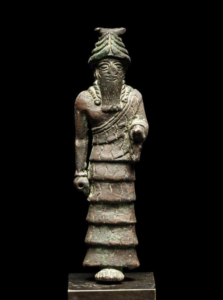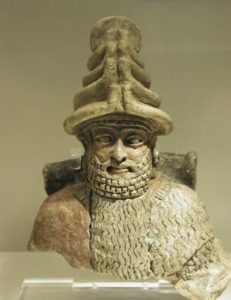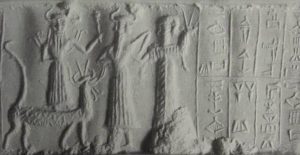(Texts: All Artifacts, Color Coding, & Writings in Bold Type With Italics Inside Parenthesis, are Added by Editor R. Brown, not the Authors, Translators, or Publishers!)
(gods in blue … mixed-breed demigods in teal)
Esarhaddon, great king, mighty king, king of the world, king of Assyria, governor of Babylon,
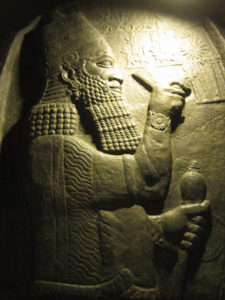
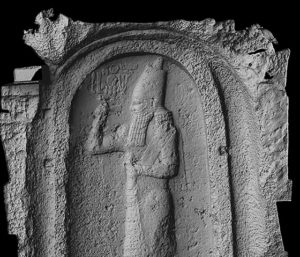 (King Esarhaddon reliefs & tomb)
(King Esarhaddon reliefs & tomb)
king of Sumer and Akkad, chosen by the god Marduk (and) the goddess Zarpanītu (Sarpanit),
true shepherd, favorite of the god Aššur (Ashur) and the goddess Mullissu (Ashur‘s spouse),
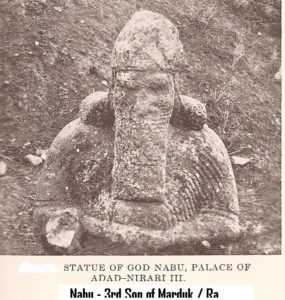
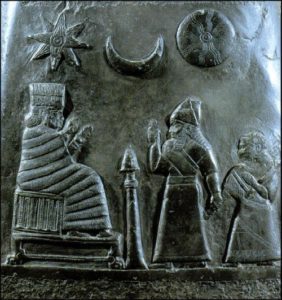 (Nabu; Nanaya, & king with ill daughter)
(Nabu; Nanaya, & king with ill daughter)
the king who from his childhood trusted in the gods Nabû, Tašmētu, and Nanāya (Nabu‘s spouse) and knew their power;
son of Sennacherib, great king, mighty king, king of the world, king of Assyria;
descendant of Sargon (II), great king, mighty king, king of the world,
king of Assyria, governor of Babylon, king of Sumer and Akkad;
descendant of the eternal (giant mixed-breed semi-divine) line of Bēl-bāni (king of Assyria 1,700 B.C.),
whose ultimate origin is Baltil (Aššur) (Ashur)—
Before my time, the great lord, the god Marduk, became furious with Esagil and Babylon,
(and) his heart was full of rage.
His people were answering each other with yes (for) no (and) were speaking untruthfully.
They put their hands on the possessions of the great lord, the god Marduk,
and gave (them) to the land Elam as a bribe.
Their deeds were displeasing to the god Marduk (and) the goddess Zarpanītu (Sarpanit, Marduk‘s spouse),
and they (the gods) ordered their scattering.

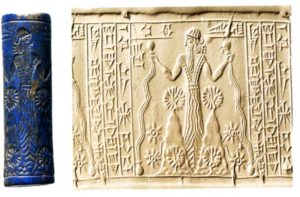 (Marduk, patron god over Babylon & Egypt)
(Marduk, patron god over Babylon & Egypt)
He (the god Marduk) made (its) waters sweep destructively across the city and he turned (it) into fallow land.
Its gods and goddesses took fright and went up to the heavens.
The site of the city was torn out and its foundation platform(s) could not be seen.
At the beginning of my kingship, in my first year, when I sat in greatness on (my) royal throne,
the merciful god Marduk’s heart was appeased and he became reconciled with the city that had angered (him).
I had Esagil (Marduk’s residence) and Babylon built anew.
I renovated the statues of the great gods (and) had (them) dwell on their seats as an eternal dwelling.
I completed the temple of the god Aššur (Ashur) (and) set up proper procedures in all of the cult centers.
At that time, Eniggidrukalamasuma, the temple of the god Nabû of the ḫarû,
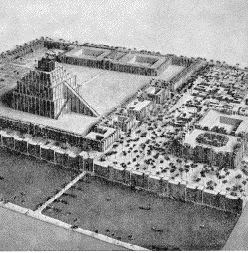 (Marduk had built temples / hotels for the gods in Babylon for their overnight visits)
(Marduk had built temples / hotels for the gods in Babylon for their overnight visits)
its site had become a heap of ruins and changed into a tell (so that)
the top of its foundations could not be seen (and) its shape could not be determined.
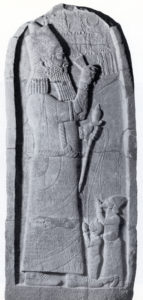 (Ashur with smaller mixed-breeds Esarhaddon & spouse)
(Ashur with smaller mixed-breeds Esarhaddon & spouse)
I, Esarhaddon, king of Assyria, whose mind the gods Aššur,
(Nannar; son Utu; Marduk, son Nabu, & unidentified mixed-breed king)
Sîn (Nannar), Šamaš (Utu), Bēl (Marduk), (and) Nabû
opened for completing the cult centers (and) renovating (their) shrines —
it occurred to me and my heart prompted me to (re)build Eniggidrukalamasuma.
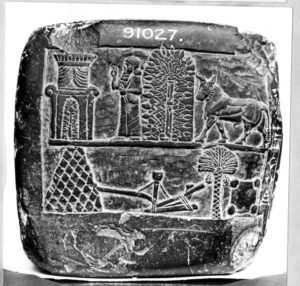 (Esarhaddon stands before Marduk’s temple in Babylon)
(Esarhaddon stands before Marduk’s temple in Babylon)
I opened up its dirt piles and surveyed (and) examined its structure.
I measured its foundation platform in (exact) accordance with its earlier plan
and did not add (even) a single brick more.
In a favorable month, on a propitious day, I laid its foundation and secured its brickwork.
I built (and) completed that temple from its foundations to its parapets (and) made (it) shine like daylight.
May the god Nabû, the sublime son (to Marduk), look with joy upon [this work],
ble[ss] my [kingship] with his steadfast heart,
(and) allow my hand to grasp the righteous scepter that widens the land.
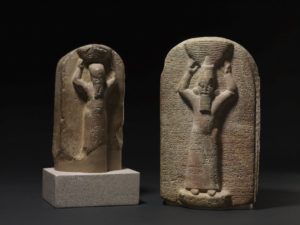 (brothers Ashurbanipal & Samas-suma-ukin, sons to Esarhaddon)
(brothers Ashurbanipal & Samas-suma-ukin, sons to Esarhaddon)
For Ashurbanipal, crown prince of Assyria, and Šamaš-šuma-ukīn, crown prince of Babylon,
both brothers, my offspring, may they decree as their destiny a good fate, a favorable fate,
one of the lengthening of the days of their reigns (and) the protection of the throne(s) of their priestly offices;
may their kingships … lead my land in truth and justice;
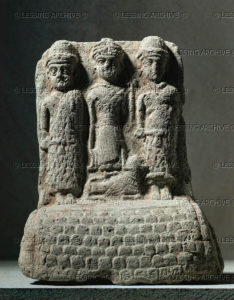 (Nannar with twin children Inanna & Utu)
(Nannar with twin children Inanna & Utu)
(and) may the gods Sîn and Šamaš together keep answering the true princes with a firm ‘yes’!
In future days, in far-off days, may a future ruler, who renovates the dilapidated section(s) of this temple
when it becomes dilapidated and old, place my inscribed name with his name.
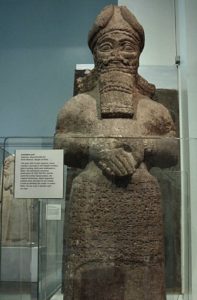 (Nabu statue, giant god in our image & likeness)
(Nabu statue, giant god in our image & likeness)
The god Nabû, the sublime son, the one who gives scepter, throne, (and) reign, will (then) hear his prayers.
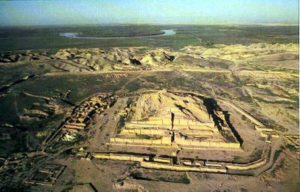
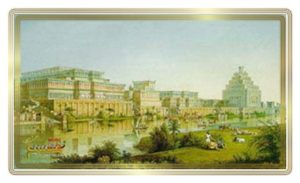 (
(